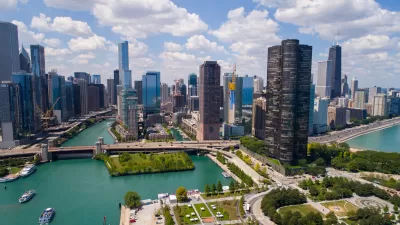The Atlantic talks with architect and planner Andres Duany about 30 years of the New Urbanism, and how the urban landscape of America has changed over that time.
"The Atlantic: How has the country--the national zeitgeist--changed since your first New Urbanist projects?
Andres Duany: When I first started practicing, there were no NIMBYs. I remember that developers were categorically admired--the people who brought us the housing and the offices and the shops that we needed. They brought us wealth. They brought us welcome neighborhoods. They pulled us away from a provincial poverty of all kinds. Everybody wanted to grow--growth had a really good name.
And of course, that's been reversed now, and people are suspicious of growth. What happened is that there was a betrayal of the vision of what suburbia was going to be like. And in fact it did not deliver the open space and the freedom to drive around and the nature that was promised. All of that was betrayed. The anger is extraordinary."
Duany also touches on the recent growth of "green" building, and bemoans the emphasis many builders and developers place on achieving green certifications.
FULL STORY: The Man Who Reinvented the City

Planetizen Federal Action Tracker
A weekly monitor of how Trump’s orders and actions are impacting planners and planning in America.

Maui's Vacation Rental Debate Turns Ugly
Verbal attacks, misinformation campaigns and fistfights plague a high-stakes debate to convert thousands of vacation rentals into long-term housing.

Restaurant Patios Were a Pandemic Win — Why Were They so Hard to Keep?
Social distancing requirements and changes in travel patterns prompted cities to pilot new uses for street and sidewalk space. Then it got complicated.

In California Battle of Housing vs. Environment, Housing Just Won
A new state law significantly limits the power of CEQA, an environmental review law that served as a powerful tool for blocking new development.

Boulder Eliminates Parking Minimums Citywide
Officials estimate the cost of building a single underground parking space at up to $100,000.

Orange County, Florida Adopts Largest US “Sprawl Repair” Code
The ‘Orange Code’ seeks to rectify decades of sprawl-inducing, car-oriented development.
Urban Design for Planners 1: Software Tools
This six-course series explores essential urban design concepts using open source software and equips planners with the tools they need to participate fully in the urban design process.
Planning for Universal Design
Learn the tools for implementing Universal Design in planning regulations.
Heyer Gruel & Associates PA
JM Goldson LLC
Custer County Colorado
City of Camden Redevelopment Agency
City of Astoria
Transportation Research & Education Center (TREC) at Portland State University
Jefferson Parish Government
Camden Redevelopment Agency
City of Claremont




























